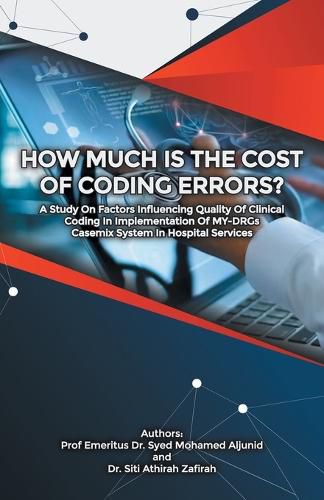Readings Newsletter
Become a Readings Member to make your shopping experience even easier.
Sign in or sign up for free!
You’re not far away from qualifying for FREE standard shipping within Australia
You’ve qualified for FREE standard shipping within Australia
The cart is loading…






This title is printed to order. This book may have been self-published. If so, we cannot guarantee the quality of the content. In the main most books will have gone through the editing process however some may not. We therefore suggest that you be aware of this before ordering this book. If in doubt check either the author or publisher’s details as we are unable to accept any returns unless they are faulty. Please contact us if you have any questions.
Casemix system or Diagnosis-Related Groups (DRGs) has been implemented in UKM-Medical Centre, currently known as Hospital Canselor Tuanku Muhriz UKM, since 2002 with the deployment of a locally developed MY-DRG casemix grouper. Coding of diagnosis and procedures using ICD-10 and ICD9-CM are among the major variables required for optimum implementation of casemix system. The impact of coding errors on hospital revenue and budget has rarely been assessed in countries that implement casemix system for provider's reimbursement. This book reports an outcome of the first study done in Malaysia to quantify the economic losses due to coding errors. A blinded re-coding process was conducted to evaluate the quality of clinical coding of randomly selected patient medical records from four major specialities in the hospital: Medical, Surgical, Paediatrics and Obstetrics & Gynaecology. The rates of overall coding errors were identified, and the different types of coding errors were analysed and reported in detail. The amount of losses in hospital revenue due to coding errors were estimated in the study. Factors that led to the coding errors of diagnoses and procedures were analysed and presented in this book. It is hope that results of this unique research reported in this book would encourage leaders in hospital services to pay serious attention on the problems and embark on intensive and continues training of coders and other clinical staff to effectively reduce the coding errors in the implementation of casemix system.
$9.00 standard shipping within Australia
FREE standard shipping within Australia for orders over $100.00
Express & International shipping calculated at checkout
This title is printed to order. This book may have been self-published. If so, we cannot guarantee the quality of the content. In the main most books will have gone through the editing process however some may not. We therefore suggest that you be aware of this before ordering this book. If in doubt check either the author or publisher’s details as we are unable to accept any returns unless they are faulty. Please contact us if you have any questions.
Casemix system or Diagnosis-Related Groups (DRGs) has been implemented in UKM-Medical Centre, currently known as Hospital Canselor Tuanku Muhriz UKM, since 2002 with the deployment of a locally developed MY-DRG casemix grouper. Coding of diagnosis and procedures using ICD-10 and ICD9-CM are among the major variables required for optimum implementation of casemix system. The impact of coding errors on hospital revenue and budget has rarely been assessed in countries that implement casemix system for provider's reimbursement. This book reports an outcome of the first study done in Malaysia to quantify the economic losses due to coding errors. A blinded re-coding process was conducted to evaluate the quality of clinical coding of randomly selected patient medical records from four major specialities in the hospital: Medical, Surgical, Paediatrics and Obstetrics & Gynaecology. The rates of overall coding errors were identified, and the different types of coding errors were analysed and reported in detail. The amount of losses in hospital revenue due to coding errors were estimated in the study. Factors that led to the coding errors of diagnoses and procedures were analysed and presented in this book. It is hope that results of this unique research reported in this book would encourage leaders in hospital services to pay serious attention on the problems and embark on intensive and continues training of coders and other clinical staff to effectively reduce the coding errors in the implementation of casemix system.